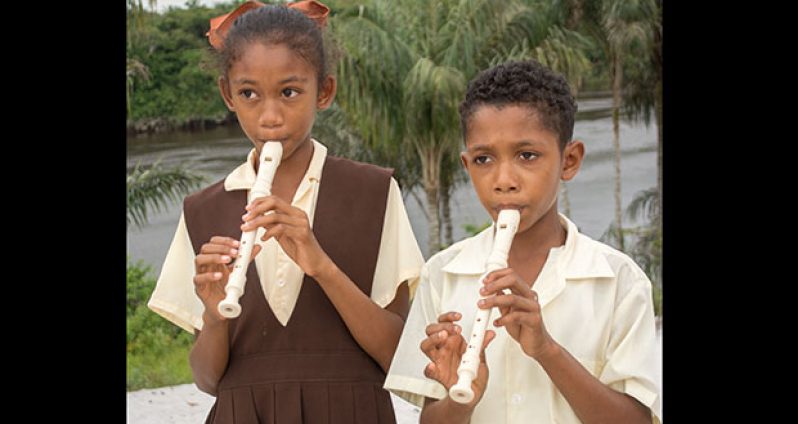By Neil Marks
The Dora Primary school sits on a white sand hill overlooking Demerara River.

To get to it, you take a drive of about one hour from Georgetown and head to the Linden-Soesdyke Highway. With no sign telling you its specific location, your best bet is to ask anyone as you go along.
Once you are pointed to the exact sand trail, it takes about a three-mile drive through forest before a clear spot opens up and you see the school.
There are three teachers, namely, the head-teacher, a teacher for the nursery department and the guy we’ve come to meet, music teacher Marcellus Cornelius, age 36.
When a vacancy arose at the school back in 2004, his father encouraged him to apply, and he did. He completed the teacher’s training college and got down to working, teaching any subject and working any classroom.
Currently, he teaches Grades 3, 5, 6 and also serves as the sports and music teacher.
Music was added to his list of duties in September, 2015 after he was called to Georgetown to take part in a one-month course in music.
Cornelius was among 90 teachers from Regions Three, Four and the Georgetown district who were selected to introduce music as a timetabled subject in their schools.
“It was always something I wanted to do,” he told the Sunday Chronicle when we visited the school last Tuesday.

The task at hand was to teach the children national songs. Before, singing was just about getting the words right.
But now, the children are able to read musical notes and they are familiar with basic musical scales and pitches.
Things got a bit more exciting last April when the school received a set of recorders to add to its music programme.
Having to juggle so many classes, in addition to sports, there is only so much time Sir Cornelius can dedicate to teaching music, but he is proud of the fact that two of his students can now play the national anthem using their recorders and just the musical notes in front of them.
“I don’t get enough time I want. With music, if you’re teaching the children, you have to teach it right and the children have to learn it the right way.”
Now, the school faces the additional challenge of being without electricity for months. The solar system went down and is yet to be fixed. That robs him of the opportunity to play music videos using the school’s TV or to play the piano accompaniment for the national songs.

But he has brought to school his own music player, resembling a car, and plays the piano accompaniment, but when the battery dies, as it often does, it’s back to square one.
Despite the time constraint, Sir Cornelius is determined to continue, as he is already seeing the benefits of the music classes.
Sir Cornelius says it important that a child be exposed to music as it only serves to enhance the learning process, something that he has seen personally.
For example, one of his Grade Six students struggled with completing a few lines of poetry, but after he was introduced to the music programme, things improved drastically.
“After learning music, he was learning entire poems, including difficult ones, and now he is off to secondary school!”

Ms Desiree Wyles-Ogle of the Allied Arts Department of the Ministry of Education, oversees the music programme in primary schools.
She says that so far 2, 500 of the recorders have been bought and are now in other schools.
The music programme has now been added to schools in Regions Two, Five and Six with 170 teachers from 85 primary schools having completed training last August.
“We would really like the children to enjoy their school life, to enrich their school life,” Ms Whyles-Ogle told the Sunday Chronicle in a recent interview.
“I find a lot of people feel if you do the arts you’re taking something out of your brain and that it would be distracting to your academic performance.
“But the arts don’t take away, it enhances learning. Children are able to think creatively, to be disciplined, t work as a team. All of these skills are necessary for learning and will benefit them throughout their life.”
What’s more, she says the focus of national songs in schools is helping to develop children who are passionate about their country.
“We need children who can have a sense of patriotism and ownership to this country; it just doesn’t come, we have to teach them.”
Apart from the August training programmes, she said the teachers selected for the music programme will be trained periodically. In order to boost their qualifications, some teachers are being prepared to write the Royal Music Academy exams.
The teachers being trained are all dedicated to the task at hand.
Ingrid Harris, the only teacher from Region One who attended the last training programme, said she would be seeking to transfer her knowledge to the students of the Santa Rosa Primary School.
After completing the programme, she said: “I will be trying my best to impart what I have learnt here when I go back to my region, and help them to bring back music into the school because it is dying in our region.”




.png)









